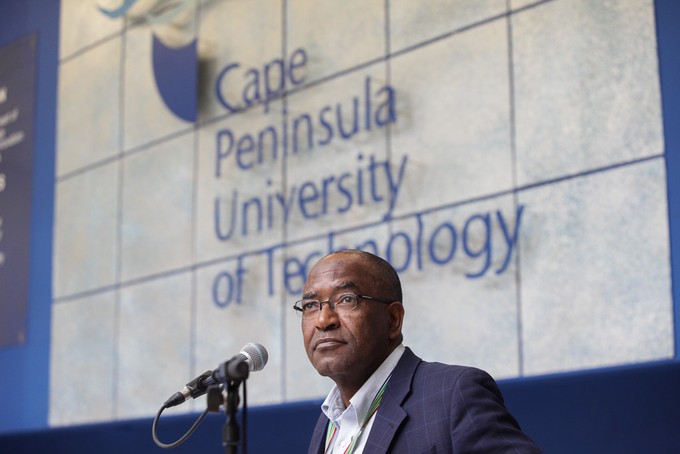Heated CPUT assembly disintegrates after vice-chancellor leaves
Students welcome news that suspension of two students has been lifted
A general assembly at the Cape Town Peninsula University of Technology (CPUT) Bellville campus ended abruptly today after vice-chancellor Prins Nevhutalu hurriedly left, following the arrival of a group of singing students.
One of the major issues that arose during the heated assembly was that two students had been suspended during earlier Fees Must Fall protests.
Following Nevhutalu’s exit, a private meeting was held with him, where the decision was made to lift the suspension of students Sapho Mahilihili and Vuyani Moerane.
During the general assembly, Nevhutalu explained why fees would increase by 8% next year. He emphasised that those currently on loans from the National Student Financial Aid Scheme and with family incomes under R600,000 would not be affected by this increase as government would be subsidising it.
In a statement, CPUT’s spokesperson Lauren Kansley said that the assembly “did eventually disintegrate after a group of students stormed the venue”. The singing students had come from the Cape Town campus, and had been delayed by debate amongst the protesters about whether to attend the assembly.
Some protesters had wanted the assembly to take place on the Cape Town campus, which they saw as safer for them following yesterday’s protest action at the Bellville campus that resulted in clashes between private security and students.
The assembly got off to a rocky start when it began about an hour and a half late. The students then read out their demands which were: free, decolonised higher education; suspended students to be allowed to return; the creation of a Truth and Reconciliation process; no fee increments; free data for off-campus students; free tampons and pads; 2016 debt to be written off for poor students; all results to be released regardless of finances; no debt collectors; the resignation of the vice-chancellor; and the insourcing of workers.
Student leader Lukhanyo Vangqa told the crowd that higher education was “prohibitively expensive” and that they “apologise for the inconvenience of classes being delayed” but they were “trying to achieve something greater”.
Nevhutalu then explained the university’s position, saying that the institution supported free education. He said that the university was in a disadvantaged position and that about 90% of the students were poor.
The university’s increase of 8% in fees would therefore only apply to 10% of students, whom he called “the rich”, as the increase for the rest would be covered by government.
The 8% increase would still leave the university R94 million in debt, he said.
“If we don’t levy the increase, government will give us no money. If we say a 6% increase, the government will give us 6% for the majority of students.” He said that “anybody who is logical” would understand why the increase needed to be levied.
Following Nevhutalu’s response, a discussion was set to take place but students wanted the second item on the agenda, the return of suspended students, to be discussed first.
When the discussion got under way, Vangqa explained said the two students had been suspended for ten months, and disciplinary hearings had yet to take place.
During this time Nevhutalu said he had an “urgent meeting” to attend, to which the students demanded that he send a representative as he was the person who called the general assembly in the first place.
Nevhutalu appeared to have decided to stay and explained that the suspended students needed to have their hearings. “I am supposed to uphold the statutory obligations of CPUT,” he said, explaining that there were rules that he needed to abide by.
Shortly after this, Nevhutalu left the building and the assembly disintegrated.
After searching for the vice-chancellor, a student leader told the crowd that there would be “no continuation of any institutional programmes until our demands are met”.
It was only following this, about two hours after the vice-chancellor left, that deputy vice-chancellor Louis Fourie addressed the few students who remained and made the announcement regarding the lifting of the two students’ suspensions.
Students shouted in jubilation at the deputy vice-chancellor’s announcement but also cautioned that there were still other students who were suspended that needed to be brought back to the university.
The students plan to meet again on Monday.
Next: Activist returns home after detention by Israel
Previous: UCT “Shackville” protesters appear in court
© 2016 GroundUp. 
This article is licensed under a Creative Commons Attribution-NoDerivatives 4.0 International License.
You may republish this article, so long as you credit the authors and GroundUp, and do not change the text. Please include a link back to the original article.



